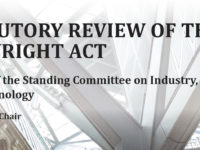The release of the much-anticipated copyright review report from the Standing Committee on Industry, Science and Technology has sparked a range of reactions. From UNEQ’s “the committee despises creators” to Canadian Music Publishers Association’s “disappointing“, some groups would clearly prefer that the government pay attention to the one-sided Canadian Heritage study instead. In fact, the report makes it clear that the committee did not read the Heritage study, as the committee thanked its colleagues and noted that it “looks forward to consulting their report.”
That approach angered Heritage committee member Pierre Nantel, who moved a motion that the committee “express its dismay” that its report was ignored. At this stage, it does not appear that the committee will consider Nantel’s motion as no further meetings are planned before the House of Commons breaks for the summer and then dissolves with the fall election.











